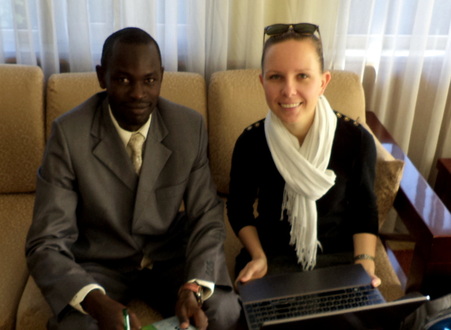|
Welcome to the SciBridge where we use nanoscience to create scientific connections between Africa and the U.S. My name is John Paul Eneku, Assistant Lecturer of Physics at Makerere University. Makerere University is found in Uganda- a country which is located in Eastern Africa. Makerere University was the first institution of higher education to be established in Uganda and today it’s a regional leader in academic excellence. Allow me take you through a bit of background to SciBridge. Materials research for energy applications in most African universities has not advanced to the latest technology of nanoscience, for reasons that include lack of expertise and the need for expensive research technology. Unlike the African universities, a number of universities in the U.S. have already developed the research expertise and technology in nanoscience materials research for energy applications and continue to progress. My collaborator Veronica Augustyn, a Postdoctoral Fellow at the University of Texas at Austin (U.S.A), and myself conceived this noble idea of SciBridge after attending the first Joint U.S.-Africa Materials Initiative (JUAMI) materials research school, which was held on 10th -21st December 2012 in Addis Ababa, Ethiopia in Africa. We were motivated and inspired by our experience at the JUAMI school and came to one mind of creating a platform for joint development and promotion of nanoscience materials research among African universities for future sustainable energy solutions. SciBridge is therefore a collaboration platform for development and promotion of nanoscience materials research for energy applications between Africa (starting with Eastern Africa) and the U.S. Veronica and I being early-career researchers in materials science created SciBridge: 1) to develop academic dialogue without expensive research equipment; 2) to inspire African undergraduate students to study and do research in nanoscience & energy; and 3) to extend the U.S.-Africa scientific network. To achieve these goals we have designed a plan of activities which you can find by clicking on the website's "How it works" tab. Our collaboration pilot universities are: Makerere University, the University of Texas at Austin, Massachusetts Institute of Technology, and the University of California & the California NanoSystems Institute. There has been an inevitable delay in receiving all the planned activity materials at Makerere University and we have rescheduled our first activity workshop for February 2014, when a new academic semester will have opened. The topic of our first activity will be dye-sensitized solar cells. Meanwhile, we also have long term goals for the SciBridge, namely: fundraising to enable achievement of goals; spreading SciBridge to other universities within Eastern Africa; domesticating experiments by inclusion in the university curriculum; academic workshops/seminars by member universities for sharing of ideas; and staff development for locally based expertise for sustainability. I would like, once again, to welcome you, our visitor, to the SciBridge and also at this point welcome your constructive inputs in all forms, be it complements, advice on how we can do it better, information on where we can go to seek support, interests to join or support us and alike. Contact us by clicking the "Contact" tab above. Thank you. Visit us again. -John Paul Working hard on our Africa-Materials Research Society conference presentation in Addis Ababa.
0 Comments
Our complete presentation from the Join U.S.-Africa Materials Initiative Symposium at the 7th Africa Materials Research Society conference is available below! SciBridge co-founders, Veronica Augustyn, Postdoctoral Fellow at the University of Texas at Austin, and John Paul Eneku, Assistant Lecturer at Makerere University in Uganda, were reunited once again thanks to Joint U.S.-Africa Materials Initiative. Here they are pictured at the African Union, the site of the Africa Materials Research Society conference. Their SciBridge proposal has received a great response from universities in Africa.
|
Archives
February 2023
|


 RSS Feed
RSS Feed
